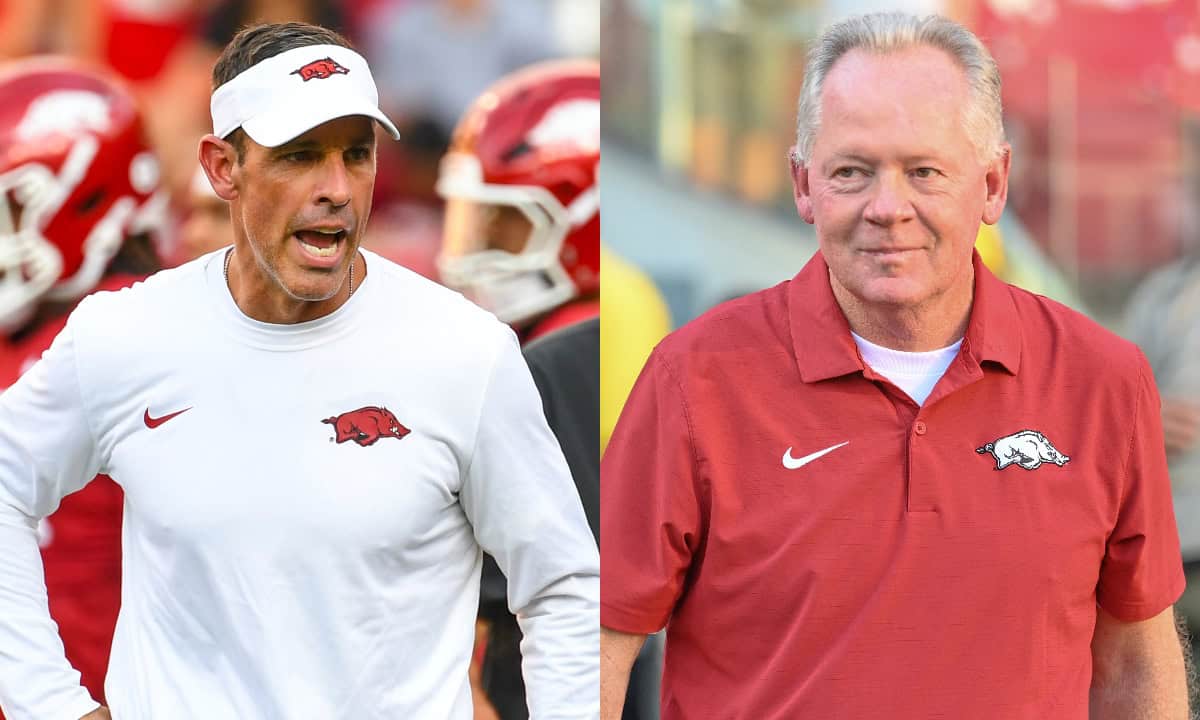When it comes to Arkansas football, conversations around the team’s performance tend to revolve around the offense, especially with the high-profile change from Dan Enos to Bobby Petrino as offensive coordinator. However, while Petrino’s offensive pedigree is well known, it’s the Razorbacks’ defense that has emerged as the surprise story of the season, reflecting a shift in both mentality and effectiveness that has caught the attention of fans and analysts alike. The defensive unit, long overshadowed by offensive struggles, has shown remarkable progress, and the effects of improved coaching, better execution, and renewed focus are starting to pay dividends on the field.
Arkansas has faced challenging seasons in recent years, with issues in consistency on both sides of the ball. The Enos-led offense struggled to find rhythm, which, in turn, put the defense in difficult situations with short field turnovers and extended periods on the field due to offensive inefficiencies. The stress on the defense was palpable as they were often tasked with bailing out the offense, leading to fatigue and, ultimately, breakdowns in critical game moments. Despite these challenges, the defense has shown a level of resilience that laid a strong foundation for their current improvement under the new regime
The defensive upgrades this season go beyond improved statistics; they reflect a change in coaching philosophy and tactical adjustments. Head Coach Sam Pittman and defensive coordinator Travis Williams, who joined Arkansas from UCF, have transformed the way the Razorbacks approach defense. Known for his aggressive schemes and ability to maximize player talent, Williams has implemented a faster, more physical style of play that has brought out the best in Arkansas’ defenders. This change has allowed players to be more assertive, take calculated risks, and capitalize on turnovers.
Unlike the Enos era, where the defense was often forced into a reactive role, the new system under Williams encourages a more proactive approach. With Petrino now running the offense, the defense is no longer burdened by the need to compensate for an inconsistent offense, and they can focus on making impactful plays and setting the tone for the game.
The Razorbacks’ defense has seen standout performances from several key players, many of whom were already on the roster but have thrived under the new system. Safety Hudson Clark, a cornerstone of the secondary, has emerged as a reliable playmaker, shutting down opposing wide receivers and demonstrating a knack for reading offenses. His increased confidence and agility on the field are a testament to the defensive coaching staff’s commitment to developing existing talent.
Linebacker Jaheim Thomas, a transfer from Cincinnati, has also become a critical part of the Razorbacks’ defense, bringing both physicality and leadership. His impact on the field is evident in his high tackle count and his ability to disrupt opposing offenses. Thomas’s hard-hitting approach and ability to anticipate plays have been essential in keeping the defense energized and focused.
The defensive line, led by Landon Jackson and Zach Williams, has improved significantly in generating pressure on quarterbacks and plugging gaps against the run. Their relentless pursuit and physicality have forced opponents into making rushed decisions, leading to turnovers and key stops that keep the Razorbacks in games.
Another factor contributing to the Razorbacks’ defensive success has been improved depth. Injuries and fatigue have often hampered Arkansas’ defensive efforts in previous seasons, but the team has made strides in conditioning and player rotations. Pittman’s commitment to depth-building has paid off, as Arkansas now has multiple players able to step up in key moments, allowing the defense to stay fresh and effective throughout the game.
This season, defensive rotations are more strategic, and players are given adequate rest to ensure peak performance in the latter stages of games. With a deeper roster and better-conditioned athletes, the defense has shown its ability to compete against high-caliber offenses, as seen in close matchups against SEC opponents.
While Petrino’s main focus is on revitalizing the offense, his presence indirectly benefits the defense. By running a more consistent and dynamic offense, Petrino reduces the defense’s time on the field, allowing them to play with more energy and efficiency. When the offense can maintain drives and control the clock, the defense has more breathing room and fewer instances where they are placed in high-pressure situations due to turnovers or stalled drives.
Additionally, Petrino’s offensive approach adds to the team’s scoring potential, which means the defense can play with a lead more often—a significant advantage that allows them to adopt a more aggressive play style. Playing with the lead means the defense can focus on forcing turnovers, creating sacks, and dictating the pace of the game instead of playing conservatively to prevent scoring.
As Arkansas progresses through the season, the improved defense will be a critical component of the team’s success. With the SEC schedule underway, the Razorbacks’ defense faces tough tests, but their renewed approach, depth, and adaptability position them well to compete against some of the nation’s most formidable offenses.
If the defense continues to execute with the same intensity and commitment, Arkansas could become a formidable force in the SEC, not just in terms of offense but as a well-rounded, resilient team capable of going toe-to-toe with any opponent. The Enos-to-Petrino upgrade may have been directed at the offense, but the real story is the defensive growth. This newfound defensive strength, combined with a more efficient offense, gives Arkansas a balanced foundation that will make them a team to watch in the coming years.
The Arkansas Razorbacks’ defense has shown tremendous growth and resilience, establishing itself as the backbone of the team this season. While much of the attention may be on Petrino’s offensive impact, it’s the defense that truly highlights the shift in Arkansas football. By taking on a more aggressive and proactive approach, the Razorbacks are shaping a defense that not only complements their offensive aspirations but could also be the key to their success in a highly competitive SEC environment.
